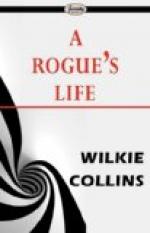I groaned in sheer wretchedness over the destruction of all my dearest plans and hopes. If the Bow Street runners had come into the plantation just as I had completed the rifling of the desk I think I should have let them take me without making the slightest effort at escape. As it was, no living soul appeared within sight of me. I must have sat at the foot of a tree for full half an hour, with the doctor’s useless bills and letters before me, with my head in my hands, and with all my energies of body and mind utterly crushed by despair.
At the end of the half hour, the natural restlessness of my faculties began to make itself felt.
Whatever may be said about it in books, no emotion in this world ever did, or ever will, last for long together. The strong feeling may return over and over again; but it must have its constant intervals of change or repose. In real life the bitterest grief doggedly takes its rest and dries its eyes; the heaviest despair sinks to a certain level, and stops there to give hope a chance of rising, in spite of us. Even the joy of an unexpected meeting is always an imperfect sensation, for it never lasts long enough to justify our secret anticipations—our happiness dwindles to mere every-day contentment before we have half done with it.
I raised my head, and gathered the bills and letters together, and stood up a man again, wondering at the variableness of my own temper, at the curious elasticity of that toughest of all the vital substances within us, which we call Hope. “Sitting and sighing at the foot of this tree,” I thought, “is not the way to find Alicia, or to secure my own safety. Let me circulate my blood and rouse my ingenuity, by taking to the road again.”
Before I forced my way back to the open side of the hedge, I thought it desirable to tear up the bills and letters, for fear of being traced by them if they were found in the plantation. The desk I left where it was, there being no name on it. The note-paper and pens I pocketed—forlorn as my situation was, it did not authorize me to waste stationery. The blotting-paper was the last thing left to dispose of: two neatly-folded sheets, quite clean, except in one place, where the impression of a few lines of writing appeared. I was about to put the blotting-paper into my pocket after the pens, when something in the look of the writing impressed on it, stopped me.
Four blurred lines appeared of not more than two or three words each, running out one beyond another regularly from left to right. Had the doctor been composing poetry and blotting it in a violent hurry? At a first glance, that was more than I could tell. The order of the written letters, whatever they might be, was reversed on the face of the impression taken of them by the blotting-paper. I turned to the other side of the leaf. The order of the letters was now right, but the letters themselves were sometimes too faintly impressed, sometimes too much blurred together to be legible. I held the leaf up to the light—and there was a complete change: the blurred letters grew clearer, the invisible connecting lines appeared—I could read the words from first to last.




